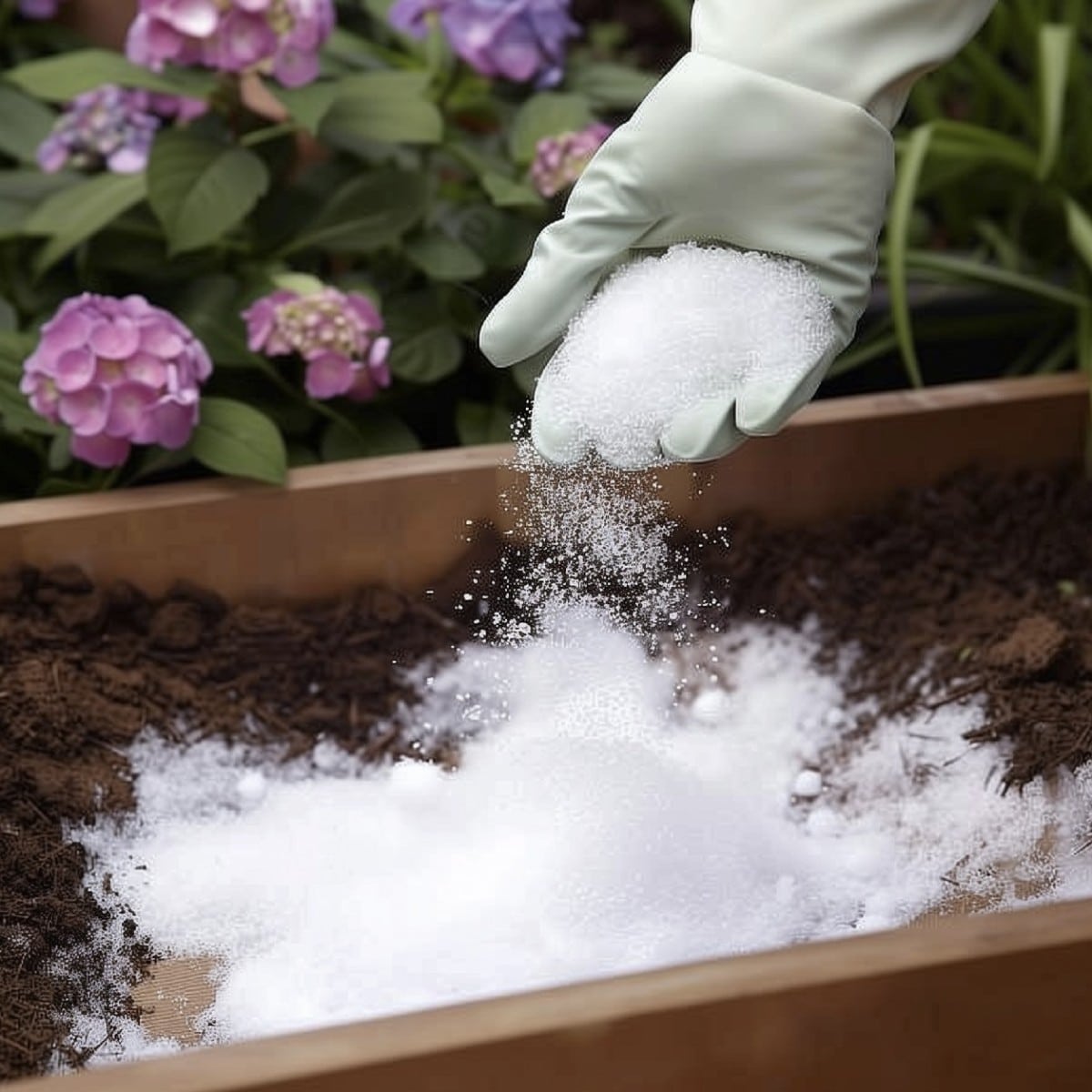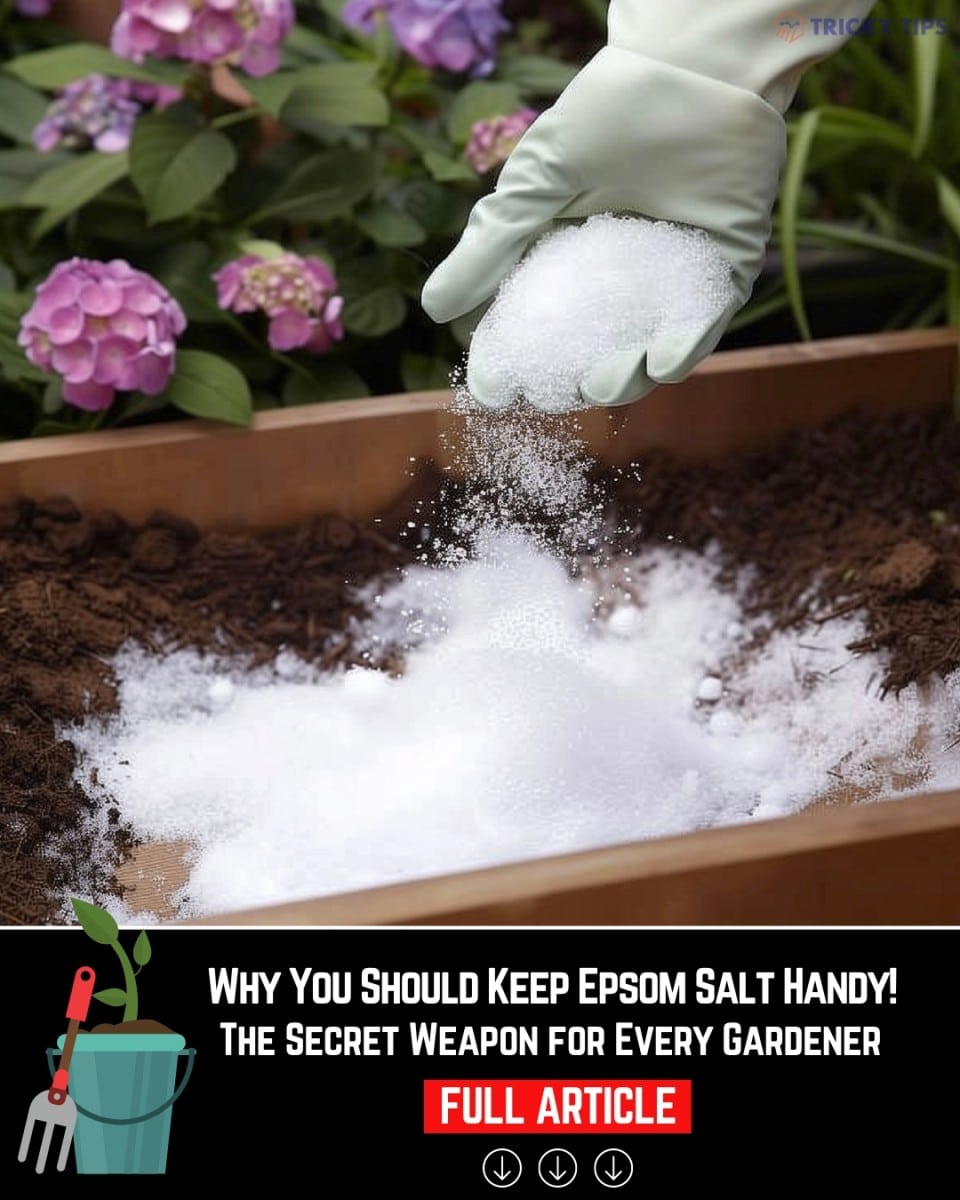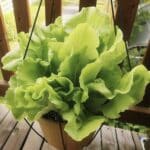
Gardening is not just a hobby; it’s a passion, a therapy, and for some, an obsession. Whether you’re a seasoned gardener or a budding green thumb, there’s one secret weapon that every gardener should have in their toolkit – Epsom salt. Yes, you heard that right! This humble household staple is more than just a remedy for sore muscles. Let’s dig deeper (pun intended) into why Epsom salt is an absolute must-have for your garden.
1. The Magic of Magnesium Sulfate
What is Epsom Salt?
Epsom salt, scientifically known as magnesium sulfate, is a mineral compound that’s been a gardening secret for centuries. It’s like the Swiss army knife of the gardening world. Magnesium and sulfur are two essential nutrients that plants need to thrive, and Epsom salt provides them in a perfectly balanced form.
Why is Magnesium Important?
Magnesium is a key nutrient for photosynthesis. It helps plants create their food, which means healthier and more productive plants. Without magnesium, plants can’t produce chlorophyll, which gives them their lush green color. So, if you’ve ever wondered why your plants look a little pale, Epsom salt might be the answer.
The Role of Sulfur
Sulfur is equally important as it helps in the production of vitamins, enzymes, and amino acids. It also aids in plant growth and resistance to diseases. Think of sulfur as the plant’s immune system booster. When combined with magnesium, it’s like giving your plants a multivitamin shot.
2. Boosting Plant Growth
Faster Seed Germination
One of the lesser-known benefits of Epsom salt is its ability to speed up seed germination. Sprinkling a little Epsom salt in the soil before planting seeds can give them a head start. The magnesium helps strengthen the cell walls, making it easier for seedlings to break through the soil and grow strong.
Healthier Plants
Regularly feeding your plants with Epsom salt helps them grow healthier and more robust. It’s particularly beneficial for plants like tomatoes, peppers, and roses, which are heavy feeders and often suffer from magnesium deficiency. A bi-weekly dose of Epsom salt can work wonders for these plants.
Improved Nutrient Uptake
Epsom salt improves the overall efficiency of nutrient uptake. It helps plants absorb other essential nutrients, like nitrogen and phosphorus, more effectively. This means you get more bang for your buck with the fertilizers you use.
3. Pest Control
Natural Pest Deterrent
Epsom salt is a natural and eco-friendly way to deter pests. It’s particularly effective against slugs and snails. These slimy critters hate the texture of Epsom salt, so sprinkling it around your plants can create a barrier that keeps them at bay.
Enhancing Plant Resistance
Regular application of Epsom salt can make plants more resistant to pests and diseases. Healthy plants are less likely to attract pests, and the sulfur in Epsom salt helps strengthen the plant’s immune system, making it harder for diseases to take hold.
DIY Pest Control Spray
You can even make a DIY pest control spray by dissolving Epsom salt in water. Spray it on your plants to keep pests away. It’s an inexpensive and chemical-free alternative to commercial pesticides.
4. Enhancing Flower Bloom
Bigger and Brighter Blooms
If you want your flowers to bloom bigger and brighter, Epsom salt is your go-to solution. The magnesium in Epsom salt helps produce more chlorophyll, which leads to more vibrant and colorful blooms. It’s particularly beneficial for flowering plants like roses, azaleas, and hydrangeas.
Prolonging Flowering Season
Epsom salt can also prolong the flowering season. By providing a steady supply of magnesium and sulfur, it ensures that your plants have the nutrients they need to keep producing flowers. This means more beautiful blooms for a longer period.
Reviving Languishing Plants
If your flowering plants are looking a bit sad and wilted, a dose of Epsom salt can revive them. It’s like a spa day for your plants, giving them the nutrients they need to bounce back and bloom again.
5. Greener Foliage
Lush Green Leaves
One of the most visible benefits of using Epsom salt in your garden is the lush, green foliage it produces. Magnesium is essential for the production of chlorophyll, which gives plants their green color. Regular application of Epsom salt ensures that your plants stay green and healthy.
Preventing Leaf Yellowing
Yellowing leaves are often a sign of magnesium deficiency. If you notice your plants’ leaves turning yellow, especially between the veins, it’s time to give them a dose of Epsom salt. It’s a quick and effective remedy that can prevent further yellowing and keep your plants looking their best.
Enhanced Photosynthesis
By boosting chlorophyll production, Epsom salt enhances photosynthesis, the process by which plants convert sunlight into energy. This means healthier and more vigorous plants that can better withstand environmental stresses.
6. Improving Soil Quality
Balancing Soil pH
Epsom salt can help balance the pH levels in your soil. If your soil is too acidic or too alkaline, it can affect nutrient availability and plant health. Epsom salt helps create a more balanced environment, making it easier for plants to absorb essential nutrients.
Enhancing Soil Structure
Epsom salt improves soil structure by promoting the formation of aggregates. These aggregates improve soil aeration and water retention, creating a better growing environment for your plants. It’s particularly beneficial for sandy or clay soils.
Promoting Healthy Microbial Activity
Healthy soil is teeming with beneficial microbes that help break down organic matter and make nutrients available to plants. Epsom salt promotes microbial activity, creating a thriving ecosystem that supports plant growth.
7. Easy Application Methods
Soil Amendment
One of the simplest ways to use Epsom salt in your garden is as a soil amendment. Just sprinkle it around the base of your plants and water it in. For best results, do this every few weeks during the growing season.
Foliar Spray
Another effective method is to use Epsom salt as a foliar spray. Dissolve Epsom salt in water and spray it directly on the leaves. This allows the nutrients to be absorbed quickly through the foliage. It’s a great way to give your plants an instant boost.
Seed Soak
For faster seed germination, you can soak seeds in an Epsom salt solution before planting. This helps strengthen the seed coat and provides the nutrients needed for a strong start. It’s particularly beneficial for larger seeds like beans and peas.
8. Epsom Salt for Specific Plants
Tomatoes and Peppers
Tomatoes and peppers are notorious for their high magnesium needs. Regular application of Epsom salt can prevent blossom end rot and promote bigger, juicier fruits. It’s a game-changer for anyone growing these plants.
Roses
Roses love Epsom salt! It helps produce more vibrant blooms and strengthens the canes. Sprinkle Epsom salt around the base of your rose bushes and watch them thrive. Your garden will be filled with the sweet scent of blooming roses.
Houseplants
Epsom salt isn’t just for outdoor plants. It’s equally beneficial for your indoor houseplants. Use it as a foliar spray or soil amendment to keep your houseplants healthy and green. It’s a simple and effective way to care for your indoor garden.
9. Cost-Effective Gardening
Affordable Solution
Epsom salt is an affordable and readily available solution for many gardening problems. It’s much cheaper than commercial fertilizers and pesticides, making it a cost-effective option for gardeners on a budget.
Multi-Purpose Use
The versatility of Epsom salt means you can use it for multiple purposes in your garden. From improving soil quality to deterring pests, it’s a one-stop solution for many gardening needs. This multi-purpose use further adds to its cost-effectiveness.
Long Shelf Life
Epsom salt has a long shelf life, so you can buy it in bulk and store it for future use. This means you’ll always have it on hand when you need it, saving you time and money in the long run.
10. Environmental Benefits
Eco-Friendly
Epsom salt is an eco-friendly alternative to chemical fertilizers and pesticides. It’s safe for the environment and doesn’t harm beneficial insects or wildlife. Using Epsom salt in your garden is a step towards more sustainable gardening practices.
Reducing Chemical Use
By using Epsom salt, you can reduce your reliance on chemical fertilizers and pesticides. This not only benefits the environment but also creates a healthier growing environment for your plants. It’s a win-win for both your garden and the planet.
Supporting Biodiversity
Healthy soil and plants support a diverse ecosystem of beneficial insects, microbes, and other wildlife. Epsom salt promotes soil health and plant growth, contributing to a thriving and biodiverse garden.
Conclusion: The Unsung Hero of Gardening
In conclusion, Epsom salt is the unsung hero of the gardening world. Its myriad benefits, from boosting plant growth to improving soil quality, make it an indispensable tool for every gardener. So, the next time you’re at the store, pick up a bag of Epsom salt and give your garden the love it deserves. Your plants will thank you with lush foliage, vibrant blooms, and bountiful harvests.



